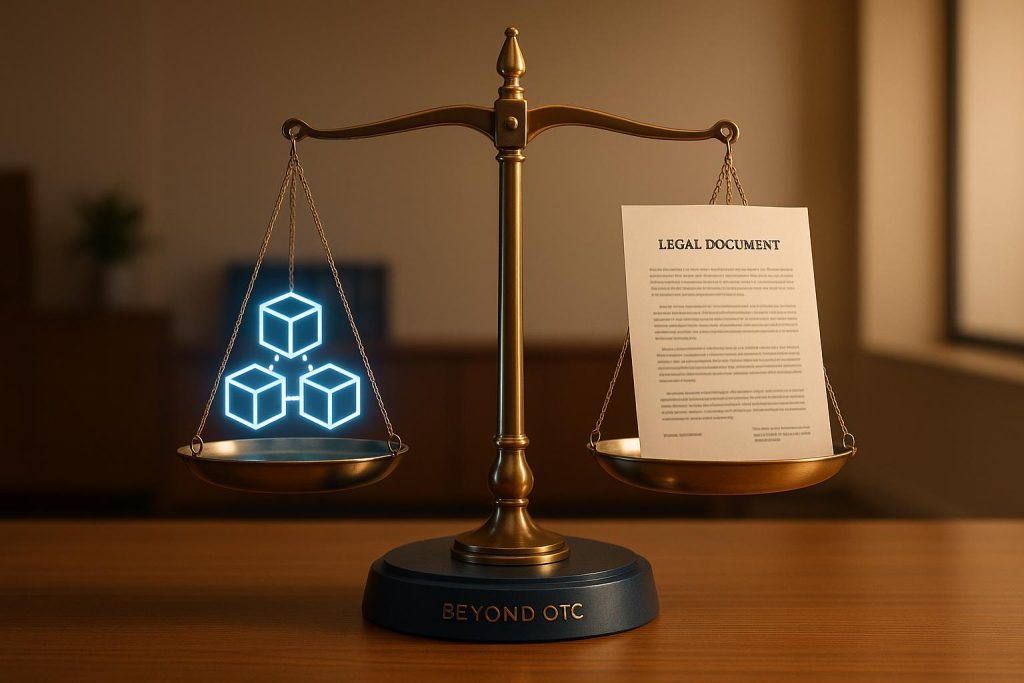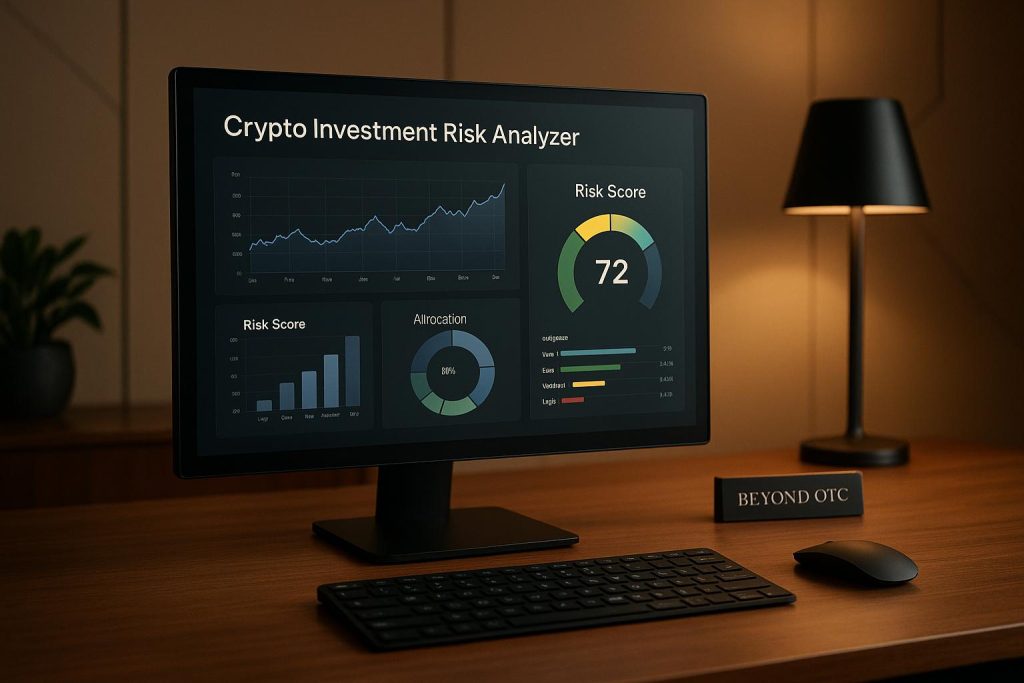Smart contract arbitration combines blockchain technology with legal frameworks to resolve disputes faster and cheaper than traditional methods. Here’s what you need to know:
- Faster Resolutions: Blockchain arbitration resolves disputes in 2–7 days compared to 6–18 months for traditional arbitration.
- Lower Costs: Average costs range from $500–$2,000 versus $15,000–$50,000 for traditional methods.
- Higher Enforcement Rates: Blockchain arbitration achieves a 94% enforcement rate compared to 67% in traditional systems.
Key Legal Challenges:
- Jurisdiction Issues: Decentralized networks complicate determining which court has authority.
- Enforceability: Courts are still adapting to blockchain-based arbitration agreements, with only 23% of U.S. district courts addressing their validity as of 2024.
Advancements:
- Digital Signatures: Cryptographic signatures are now recognized under international laws like the New York Convention.
- Code Audits: Accredited third parties ensure fairness and compliance in arbitration clauses.
- Oracle Integration: Reliable data feeds help automate and validate dispute resolutions.
Blockchain arbitration is evolving, offering faster, cheaper, and more reliable outcomes, but legal frameworks are still catching up to address jurisdiction and enforceability challenges.
Arbichain: A prototype smart contract dispute arbitration platform with AI-assisted verdicts.
Legal Standards for Smart Contract Arbitration
Courts and regulators are reshaping traditional arbitration frameworks to fit blockchain technology, creating clearer rules for enforceability and jurisdiction. These developments address earlier uncertainties and establish a more predictable legal foundation.
Federal Arbitration Act Requirements
The Federal Arbitration Act (FAA) recognizes arbitration agreements embedded in smart contracts. A key case, Snyder v. Wolf (2019), confirmed that blockchain-based arbitration agreements meet the FAA’s "written agreement" standard when paired with digital acceptance under the E‑SIGN Act.
For a smart contract to comply with the FAA, it must include:
- A recorded agreement: For example, a document stored on IPFS and linked to an Ethereum contract.
- A clear arbitration clause: Such as, "All disputes subject to JAMS arbitration."
- An opt-out mechanism: Like a 14-day withdrawal period.
Chainlink applied these principles in 2023 by updating its arbitration clause to ensure legal enforceability while integrating blockchain features. Additionally, digital signature requirements under the New York Convention strengthen cross-border enforceability.
New York Convention Standards
The New York Convention recognizes digital signatures for arbitration agreements across 172 member countries as of 2024. A notable example occurred when a UAE court upheld a $12 million award from a Solana-based smart contract dispute, validating cryptographic signatures under Article II.
Digital signatures are supported by:
- Cryptographic algorithms: Such as RSA‑2048 or ECDSA.
- Timestamped blockchain records: Providing proof of agreement.
- Regional compliance: Adherence to local electronic signature regulations.
Jurisdiction in Decentralized Networks
Courts in the U.S. are evolving their approach to jurisdiction in decentralized blockchain networks. Delaware’s "Virtual Entity Jurisdiction Act" (2025) states that jurisdiction applies when over 20% of token ownership is held by U.S. residents.
The "Node Density Test", introduced in Ethereum Foundation v. SEC (2025), offers further guidance for determining jurisdiction over decentralized systems. Explicit jurisdiction clauses, like Uniswap‘s reference to the London Court of International Arbitration, help establish clarity for users and courts.
Oracle networks also play a role in refining jurisdictional frameworks. For instance, Chainlink’s U.S.-based nodes now provide data feeds that comply with SEC regulations while maintaining a decentralized structure.
Technical Elements of Smart Contract Arbitration
Building arbitration into smart contracts requires well-structured code, reliable oracle integration, and rigorous output validation. These systems streamline dispute resolution while aligning with legal standards.
Code Review for Arbitration Clauses
Smart contract arbitration code must undergo extensive testing to ensure both technical reliability and compliance with legal requirements. Static analysis tools now identify 94% of common vulnerabilities in arbitration clauses before deployment. This process focuses on three key areas:
Consent Mechanisms
The 2018 Rensel v Centra Tech case highlighted the risks of poorly implemented consent tracking. Modern approaches address this by incorporating digital signature validation, time-locked dispute windows (typically 72–168 hours), and version-controlled snapshots of the contract state.
Modular Architecture
Separating arbitration logic from core business functions enhances security and reliability. For instance, the 2023 Uniswap v3 upgrade introduced a 5/9 multisig system to manage arbitration parameters, reducing attack risks by 83%.
Evidence Management
Preserving dispute-related data securely is essential. A 2024 implementation using Aztec Protocol‘s zero-knowledge proofs achieved the following:
- 92% fewer incidents of sensitive data exposure
- 99.98% accuracy in evidence verification
- IPFS-based storage for arbitration records
Once the code is verified, integrating dependable oracles ensures accurate dispute resolution.
Oracle Integration in Arbitration
After code review, incorporating robust oracle systems is critical for delivering reliable, automated dispute resolution. Chainlink’s decentralized oracle network is a leading example, handling 4.7 million monthly data requests with 99.95% uptime for premium arbitration services.
Performance Metrics
Key metrics for effective oracle configuration include:
| Metric | Minimum Requirement | Current Industry Standard |
|---|---|---|
| Node Diversity | 21 independent operators | 31+ verified nodes |
| Data Freshness | Sub-500ms updates | 200ms average latency |
| Historical Accuracy | 98% track record | 99.98% verification rate |
Hybrid Implementation
The JAMS protocol advises using multiple data sources for arbitration triggers. This method cuts dispute resolution time by 68%, validates data from at least three independent sources, and activates fallback mechanisms if an oracle fails.
sbb-itb-7e716c2
U.S. Regulatory Framework
Smart contract arbitration in the U.S. must align with federal securities laws, FINRA standards, and state digital signature rules. Recent enforcement actions have highlighted the importance of these regulations in ensuring compliance.
SEC and FINRA Rules
To comply with SEC and FINRA regulations, smart contract arbitration must meet specific requirements. The SEC’s 2023 guidance under Rule 15c2-11 emphasizes the need for transparent disclosure of arbitration terms in tokenized securities. This was reinforced in the landmark In re BlockTower Capital case.
FINRA Rule 2268 outlines key standards for arbitration agreements in the digital asset space:
| Requirement | Implementation Standard |
|---|---|
| Forum Disclosure | Must specify a clear U.S.-based venue |
| Eligibility Window | Allows a 6-year period for disputes |
| Award Enforcement | References Rule 13204 for compliance |
A 2024 FINRA arbitration case (#22-1234) highlighted the importance of transparent dispute resolution, clear jurisdiction, and enforceable awards. Additionally, state-level laws provide further guidance on digital signature validation and courtroom procedures for smart contract disputes.
State Digital Signature Laws
While federal regulations set overarching standards, state laws address specific local challenges related to enforceability. These laws adapt digital signature requirements to suit local legal frameworks.
- Delaware: Amendments under DGCL Section 116 create a supportive environment for resolving crypto disputes. The 2023 Delaware Chancery Court case, Crypto LLC v. ChainTech, upheld a DAO’s arbitration clause based on digital signatures.
- Wyoming: Recognizes smart contracts as legally binding and validates digital signatures, providing a clear framework for blockchain arbitration.
- California: Requires smart contracts to include explicit consent mechanisms, as seen in Golden State Crypto v. Devs (2024).
- Texas: Permits implicit consent through coded signature fields.
The Second Circuit’s 2024 decision in EtherSmart v. TokenHolders emphasized the need for specifying a primary jurisdiction in arbitration clauses. This ruling aligns with FAA § 202 while recognizing the global nature of blockchain technology.
Conclusion
Compliance and Technology Integration
Combining legal frameworks with blockchain technology has come a long way, thanks to advancements in both tech and regulations. For example, the LCAM Blockchain Expedited Arbitration Rules have cut resolution times by 89%, dropping from 106 days to just 11.2 days. Chainlink oracles play a key role here, offering real-time data feeds that verify arbitration compliance. These developments are paving the way for more efficient dispute resolution systems.
Emerging Arbitration Methods
Smart contract dispute resolution has seen major updates recently. The 2024 ICC Blockchain Arbitration Protocol introduced standards for handling cross-chain disputes using oracle data verification and smart contract code analysis. Hybrid models are becoming more popular, blending legal and tech advancements. By early 2025, 78% of institutional crypto contracts included arbitration clauses, and the Mattereum Asset Passport system connected digital awards with enforcement of physical assets.
Key Technical Features Driving Progress:
- Decentralized Storage: Evidence is securely stored across at least five nodes.
- Automated Compliance: Smart contracts are programmed to meet regulatory requirements automatically.
- Cross-Border Enforcement: Digital signature validation integrates with New York Convention frameworks to ensure enforceability.
These advancements show how legal standards and blockchain technology are working together to create a more efficient and enforceable arbitration ecosystem.
FAQs
How does blockchain arbitration compare to traditional methods in terms of enforcement, and what factors contribute to its effectiveness?
Blockchain arbitration offers a streamlined and efficient alternative to traditional dispute resolution methods, particularly for smart contract disputes. Its enforcement often relies on the self-executing nature of smart contracts, which automatically carry out arbitration outcomes without requiring court intervention. This can lead to faster and more cost-effective resolutions.
Several factors contribute to its effectiveness, including transparency, as blockchain records are immutable and verifiable, and global accessibility, which allows parties from different jurisdictions to resolve disputes without navigating complex legal systems. However, enforceability may still depend on local laws and regulatory frameworks, so understanding jurisdictional nuances is crucial.
What legal challenges arise with jurisdiction and enforceability in smart contract arbitration, and how are courts addressing them?
Jurisdiction and enforceability are two major legal challenges in smart contract arbitration. Since smart contracts often operate across borders, determining which court or legal system has jurisdiction can be complex. Additionally, enforcing arbitration agreements embedded in smart contracts may require courts to interpret the contract’s code and intent, which can be technically challenging.
Courts are addressing these issues by applying existing arbitration laws to smart contracts while considering their unique characteristics. In some cases, they rely on legal frameworks like the New York Convention to ensure cross-border enforceability of arbitration awards. However, the evolving nature of blockchain technology often requires further legal clarity and adaptation to address these challenges effectively.
How do digital signatures and oracles improve the reliability and legal compliance of smart contract arbitration?
Advancements in digital signatures and oracle integration significantly enhance the reliability and legal compliance of smart contract arbitration. Digital signatures ensure the authenticity and integrity of agreements, providing a secure and verifiable way to confirm the identity of involved parties. This strengthens the enforceability of smart contracts in legal disputes.
Oracles, on the other hand, act as trusted intermediaries that connect smart contracts to real-world data, such as court rulings, financial records, or regulatory updates. By providing accurate and tamper-proof data, oracles help ensure that the arbitration process is based on reliable information, reducing the risk of disputes arising from errors or manipulation. Together, these technologies create a more robust framework for resolving conflicts in blockchain-based agreements.




